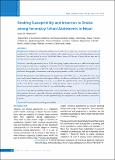Please use this identifier to cite or link to this item:
https://hdl.handle.net/20.500.14356/1771Full metadata record
| DC Field | Value | Language |
|---|---|---|
| dc.contributor.author | Aryal, U R | - |
| dc.contributor.author | Bhatta, D N | - |
| dc.date.accessioned | 2023-05-22T06:51:55Z | - |
| dc.date.available | 2023-05-22T06:51:55Z | - |
| dc.date.issued | 2015 | - |
| dc.identifier.citation | Aryal UR, Bhatta DN. Smoking Susceptibility and Intention to Smoke among Secondary School Adolescents in Nepal. J Nepal Health Res Counc. 2015 Jan-Apr;13(29):26-30. PMID: 26411709. | en_US |
| dc.identifier.issn | Print ISSN: 1727-5482; Online ISSN: 1999-6217 | - |
| dc.identifier.uri | http://103.69.126.140:8080/handle/20.500.14356/1771 | - |
| dc.description | Original Article | en_US |
| dc.description.abstract | Abstract Background: Smoking Susceptibility (SS) and Intention to Smoke (IS) are important characteristics of early stages of smoking career of adolescents. Several psychosocial factors play crucial roles in prevention of smoking initiation among adolescents. This study utilized the recent Global Youth Tobacco Survey (GYTS) data of Nepal with the main aim to correlate factors associated with SS and IS. Methods: Nationally representative data on 2,878 school going Nepalese adolescents were collected through second GYTS using two-stage cluster sampling. An anonymous and self -administrated questionnaire was used to collect information on smoking related variables. We applied multivariable logistic regression to examine relationship between risk factors (demographic, environmental, motivating and programmatic variables) and SS and IS. Results: The prevalence of SS and IS among never smokers was 22.8% (95% CI: 21.2, 24.5) &11.4% (10.2, 12.6) respectively. Factors found associated with respect to different variables were as follows: SS -being a male (AOR: 1.32; 95% CI 1.04, 1.69), friend smoking (1.97; 1.53, 2.52), offered free cigarettes (1.41; 1.03, 1.93), parental smoking (1.68; 1.32, 2.12); IS -being a male (1.43; 1.04, 1.97), and parental tobacco use (1.52; 1.11, 2.08). The following factors were protective measures for SS and IS - age, and antismoking messages. Conclusions: Smoking susceptibility and intention to smoke is prevalent in Nepalese school going adolescents. Several aforementioned factors are responsible to become susceptible and intention to smoke. Therefore, an understanding of the influencing factors of adolescents provides important insight for comprehensive school based tobacco intervention programs. Keywords: Factors; intention; smoking; susceptibility. | en_US |
| dc.language.iso | en | en_US |
| dc.publisher | Nepal Health Research Council | en_US |
| dc.relation.ispartofseries | Jan-April, 2015; | - |
| dc.subject | Factors | en_US |
| dc.subject | Intention | en_US |
| dc.subject | Smoking | en_US |
| dc.subject | Susceptibility | en_US |
| dc.title | Smoking Susceptibility and Intention to Smoke among Secondary School Adolescents in Nepal | en_US |
| dc.type | Journal Article | en_US |
| local.journal.category | Original Article | - |
| Appears in Collections: | Vol. 13 No. 1 Issue 29 January - April 2015 | |
Files in This Item:
| File | Description | Size | Format | |
|---|---|---|---|---|
| 26_30.pdf | Fulltext Download | 193.17 kB | Adobe PDF |  View/Open |
Items in DSpace are protected by copyright, with all rights reserved, unless otherwise indicated.
